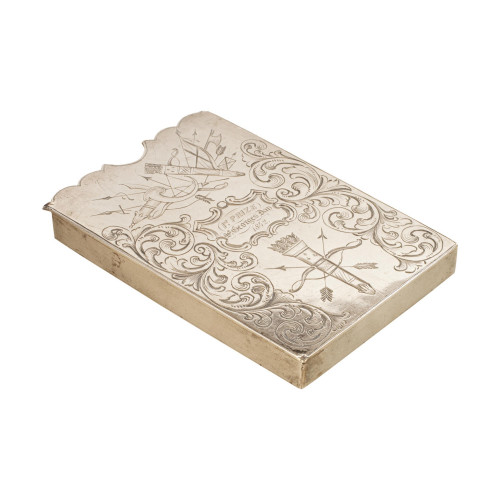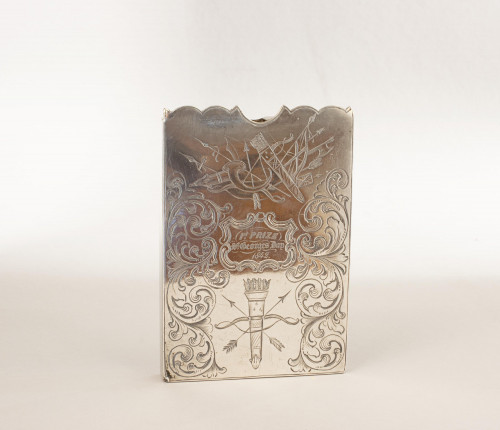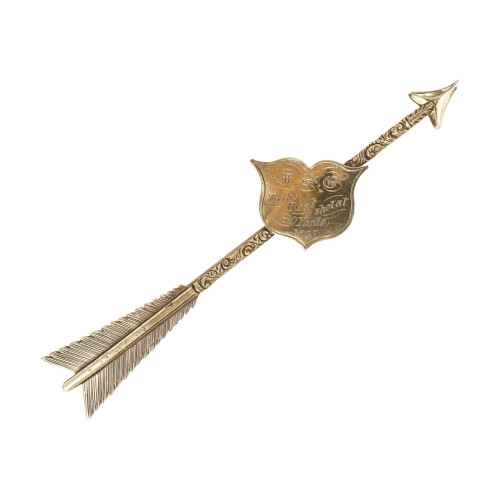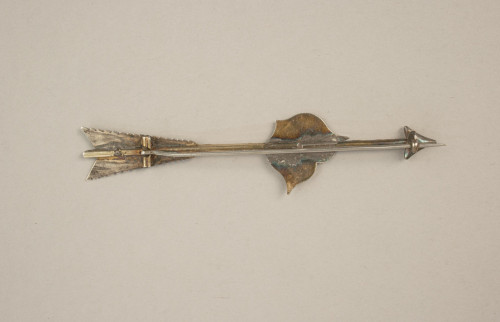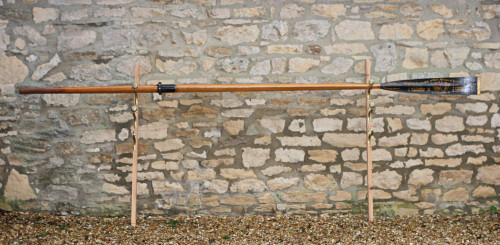- Home
- Rowing & Yachting
- Antique Rowing Seat, Oxford University, 1890
Antique Rowing Seat, Oxford University, 1890
Antique Rowing Seat, Oxford University, 1890
29956
Oxford University, Exeter College Presentation Rowing Seat, 1890 Summer Eights.
An unusual original presentation trophy seat from 'Exeter College Boat Club, Summer Eights, 1888'. The sliding seat with gold calligraphy and the crest of Exeter College Boat Club. Exeter College Boat Club (ECBC) is the boat club of Exeter College, Oxford, England. The club trains on the Thames on the Isis stretch in Oxford and at Abingdon. The Boat Club competes primarily in Torpids and Summer Eights bumps races in Oxford and has a boathouse on Christ Church Meadow which it shares with Brasenose College Boat Club. Very unusual to use the seat for the honours, normally an oar is used for a member of the crew or the rudder for the cox. Perhaps the chap in question was limited for space?
The calligraphy on the rudder reads:
Exeter College Boat Club, Summer Eights 1890.
Bow. G.F. Wenborne. 10st, 1lbs
2. J.L. Burbey. 10,9 ½
3. C. Littlehales. 10,9 ½
4. F.J.W. Tavener. 10, 9
5. W.L. Kindersley. 12st, 10lbs
6. A.I. Smallwood. 11, 2
7. W. Moat. 10, 8 ½
Str. W.I. Thompson. 10, 5
Cox. W.C. Allen. 8st, 3lbs
Bumps racing in Oxford began in 1815, when boats from Jesus and Brasenose raced each other home following an excursion to Iffley lock. The narrow width of the Isis forced the two crews to race behind one another, rather than side-by-side. Brasenose won the first race, and retained their title the following year.
(An amusing fact about Exeter's Turl Street rival: Jesus men's second-placed finishes in 1815 and 1816 remain their highest-ever position on the river.)
The club was founded in 1823 by Henry Bulteel, whom contemporaries described as a fearsome individual. Bulteel, who was a fellow at Exeter, only had one eye (the other having been knocked out during a cricket match at Eton), and was known for inciting religious riots in Oxford over the king's divorce.
Exeter completed the quartet of ancient Oxford boat clubs with the adoption of red blades, following Brasenose (black), Jesus (green), and Christ Church (blue - formed in 1817).
Exeter became Head of the River in their maiden year, bumping all crews on their way to the top in 1824.
The decades following Exeter's foundation saw the club rise to the summit of English rowing.
In 1839, the increasing popularity of rowing led to the creation of an event for second boats. The name of this new regatta - the Torpids - was a brass-necked reference to the speed of the participants. Exeter participated in the first Torpids, and would proceed to win thirteen of the first thirty editions.
Several famous rowers were members of the club in the 19th century. There was Frank Willan, who won four consecutive Boat Races (1866-1869) and was an early proponent of the bow ball. Another was Richard 'Dick' Kindersley, a three-time Boat Race winner, who was a giant for the time at 14st and 6ft3in. He also won blues for rugby and boxing, and was capped by England for rugby. A disputed try by Kindersley in 1884 led to the creation of the International Rugby Board, now World Rugby.
Exeter led some impressive campaigns in this period to claim headship in Eights. By far the most impressive was in 1882, when a heavy underdog crew made up of Torpids rowers bumped Brasenose, Hertford, and Magdalen to become Head of the River. The club retained headship comfortably for the next two years, before losing out to a monstrous Corpus Christi crew. 1884 remains Exeter's most recent headship.
Oxbridge colleges are not typically successful at Henley Royal Regatta today: the most recent club to win an event was First and Third of Trinity (Cambridge) in 1967.
Circumstances could not have been more different in the 19th century when every competition was dominated by colleges. Exeter was among them, winning the Silver Goblets pairs competition in 1851 and the Ladies' Challenge Plate for intermediate eights in 1857.
Exeter's most spectacular victory, however, was achieved in 1882. The first eight, fresh from winning headship in Oxford and bolstered by the return of two Blues, entered the Grand Challenge Cup - the premier event at the regatta, contested today by Olympic crews. In the final, they defeated Thames Rowing Club by a margin that remains one of the largest in the Grand's history.
Other years were not so glorious. In the 19th century, Oxford clubs rowed their boats the entire 50 miles to Henley, which could present problems. In 1858, Exeter's boat faced thunderstorms and a crew-wide outbreak of diarrhoea that led to two rowers collapsing from exhaustion. They were heavily defeated in the first heat and had to immediately make the long journey home.
Taken from Exeter College Boar Club website.
Dimensions:
1850-1899
1890
Pine
England
Exeter College Boat Club
The calligraphy is a little difficult to read in full as the varnish has blistered and bubbled.
Thank you for your enquiry.
We will get back to you soon.
Please create wishlist to add this item to
RELATED ITEMS






















